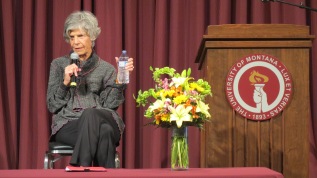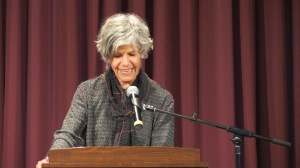On a Sunday afternoon in Paris, while walking through the Luxembourg Gardens, Susan Stamberg came across a woman holding a sign that said “Hello! Let’s Talk.” Stamberg sat down with her, and when 81-year-old Miss Lily discovered she worked as a radio correspondent for NPR, she asked, “Well, don’t you want to interview me?”
“Do lobsters want to fly? Of course,” Stamberg said, relating the tale to the audience at UM, gathered for the School of Journalism’s annual Dean Stone Lecture. Each spring the UM School of Journalism honors its founder, Dean Arthur Stone, and current journalism students with a two-night celebration featuring a guest lecturer followed by an awards banquet.
Miss Lily told Stamberg about a certain loneliness that she saw in people that she hoped to ease by getting more strangers to talk to each other. As a journalist, Stamberg related to Miss Lilly’s mission because she always tried to take her interviews with people to a more intimate level and advised students to do the same.
“Don’t accept ‘fine’ as an answer. Tell me what’s really happening. Go deeper,” Stamberg said. “After talking with Miss Lily I felt like I was walking on joy. It was such a serendipitous experience. I look for her every time I’m back in Paris.”
Stamberg started working at NPR in 1971 as a tape editor, but started hosting All Things Considered the following year. In the US, she became the first woman to anchor a nightly news broadcast fulltime. “It was a time when anything was possible at NPR,” Stamberg said. “We were still inventing ourselves, so we got to do everything.”

Dean of the UM School of Journalism, Larry Abramson, worked with Stamberg at NPR for many years, often sharing a ride to the office together. “Susan, for me, and for her followers, led the pathway out of a stiffer kind of journalism,” he said. “She showed that you can be a good journalist and be passionate, without sacrificing your objectivity.”
Stamberg also shared stories about her work with professor Jule Banville’s Advanced Audio class earlier that day. Her favorite pieces covered individuals’ personal achievement, “especially in the face of vigorous challenges.”
“Students asked her about her curiosity, how she keeps it sharp after all these years of reporting and interviewing,” Banville said. “She told them, ‘it’s not so much about style as it is about curiosity.’ I wrote it on the board because I thought it was so insightful.”
Later, Stamberg joked, “I am getting worse at remembering things, but I guess that’s why God invented Google.”
Yet having now worked at NPR for 45 years, she credited her genuine curiosity to the fact that she’s a life-long learner. After growing up as an only child, Stamberg also maintained her desire to reach out to new people, understand and befriend them.
“Susan’s an extremely diligent listener,” Larry Abramson said. “She can show the students how important it is in broadcast, and in journalism in general, to be a good listener.”
Stamberg took the time to listen to parts of Banville’s class’s brand new podcast series, Rest Stop Radio, offering feedback and sharing in their excitement.
“I’d always heard about how lovely and gracious she was, and now I know that’s the truth,” Banville said. “She made a huge impression on my students and on me, too. We were so lucky to get to know her.”
By Jana Wiegand

